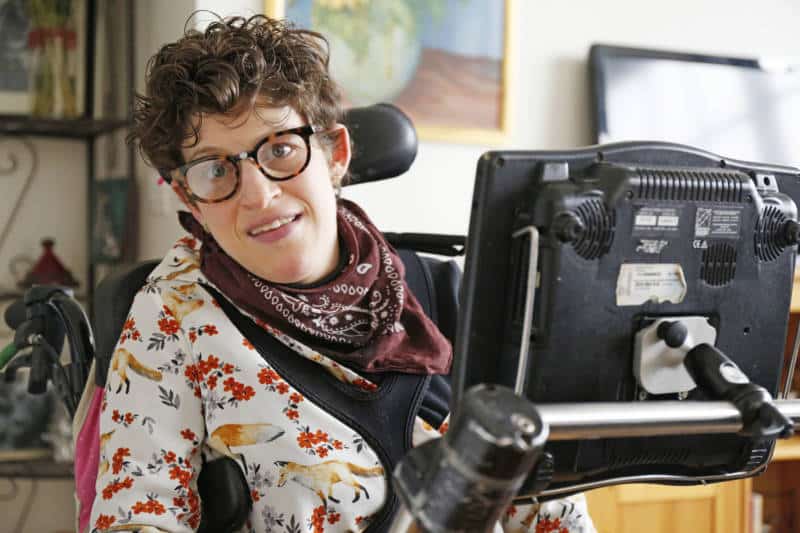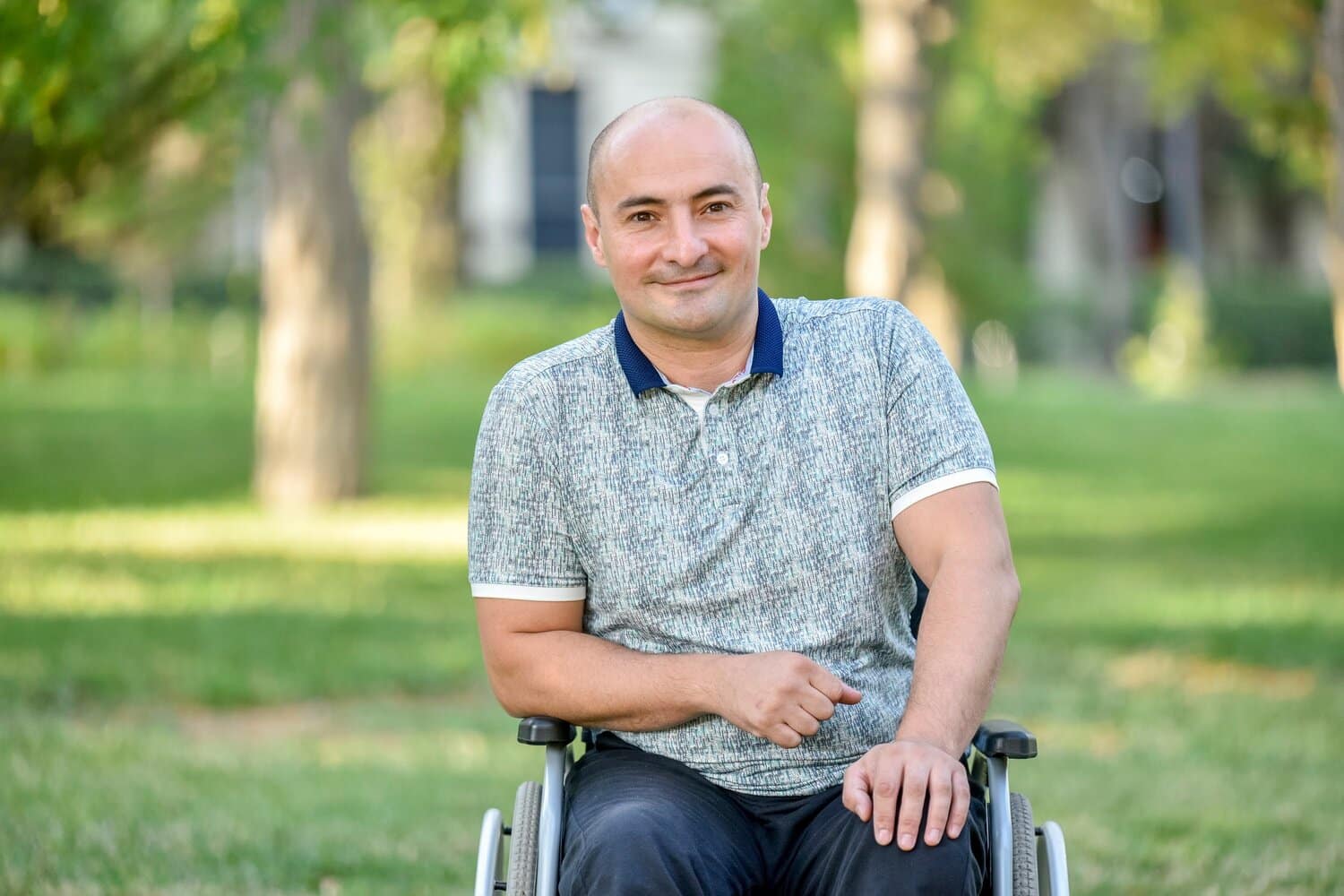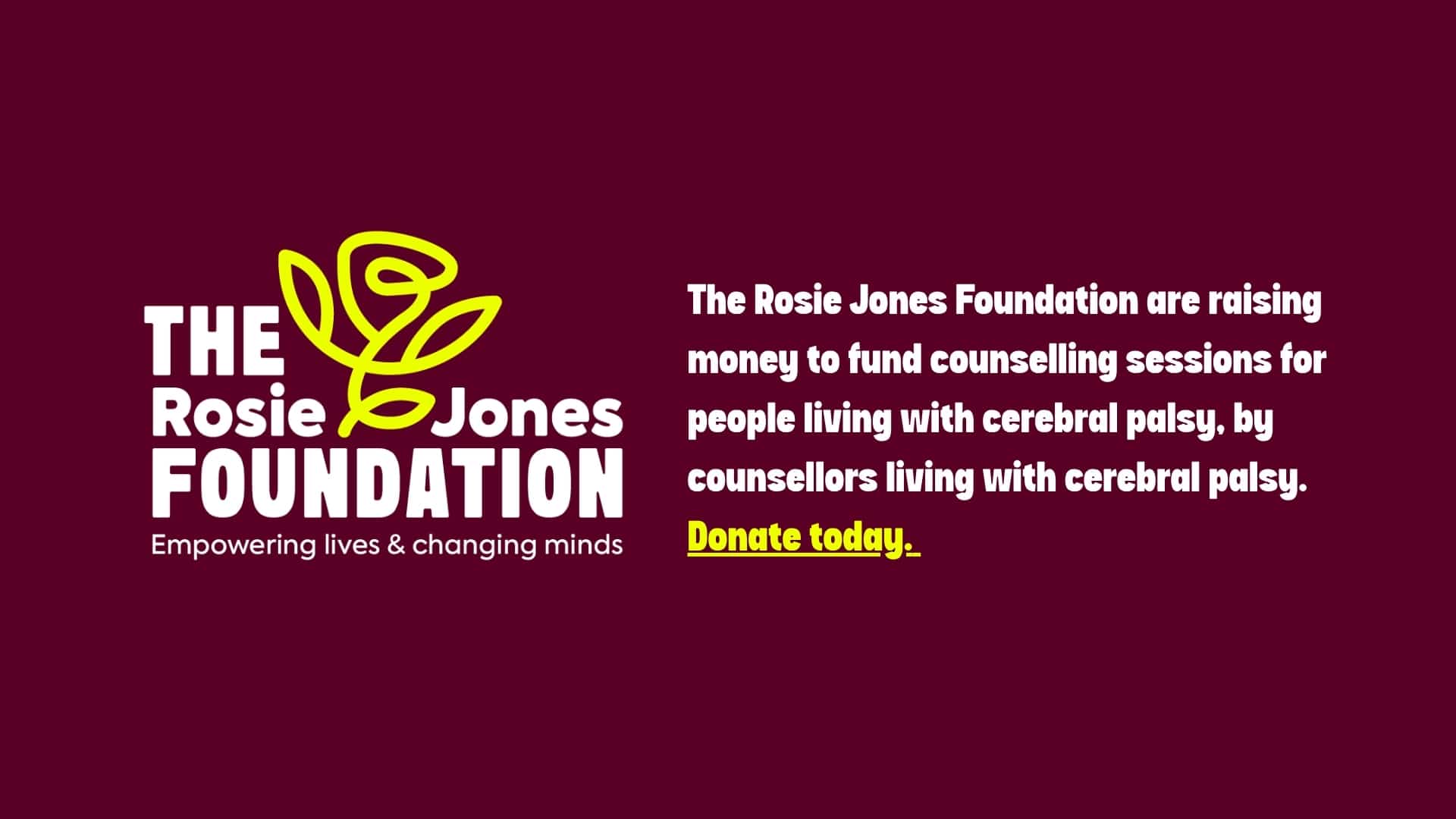Real Stories, Real Lives, Real Impact, Lived Experience Matters
Cerebral Palsy, Mental Health Counselling (Therapists with CP)
Self-Paid Referral Form & Pricing
Free Funding Referral Form
Enquiries & Questions
Professional Referrals
Explore all other Services
"The journey with cerebral palsy is unique to each individual.
We will help you embrace your resilience, discover new ways to thrive, and connect you with a community that understands you're not alone."
Living with cerebral palsy presents unique challenges, impacting everything from physical abilities and social interactions to emotional well-being.
Navigating these challenges can bring a range of emotions, and you don’t have to face them alone. Our cerebral palsy counselling services are here to support you at every stage of your journey.
Our experienced and registered counsellors all have cerebral palsy themselves, so they truly understand the lived experience. We provide compassionate care and guidance tailored to your specific needs. We also offer free funding for our counselling services in most parts of England and Wales, and self-paid options are available for clients across the UK who want to start counselling within seven days.
Lived Experience Matters
Why Choose Us?
Psychological Therapies: from Counsellors with CP, for People with Cerebral Palsy
Funding Your Cerebral Palsy Counselling
We believe that cost should not be a barrier to getting the support you deserve. There are several ways to fund your therapy journey, and we are here to help you understand the options available.
1. Self-Funding
Self-Funding The most straightforward way to begin counselling is to fund it yourself.
This offers the most flexibility, allowing you to start your sessions without delay. Please get in touch with us to discuss our current fees for individuals.
Session 1: £50 & £180 for every three sessions thereafter.
4. NHS and GP Referrals
You may be able to access NHS funding for your therapy in most parts of England and Wales by self-referring or asking your GP to refer you.
While the NHS provides its own mental health services, sometimes they are unable to support individuals with more complex needs.
We frequently find that people with cerebral palsy are discharged from local services because their situation is deemed ‘too complex”.
In these cases, we can often support you and your GP in making a funding application to the NHS for your therapy with us. This is typically done through an Individual Funding Request (IFR).
2. Access to Work
If the challenges you’re facing are affecting your job, you may be eligible for full funding through the government’s Access to Work scheme.
This programme is designed to provide the support you need to thrive in your career, and this can include specialist therapy, such as Disability Counselling. We can provide you with information to help you with your application.
We Can Help: Please reach out to us, and we can discuss these options with you in more detail.
5. Support from Charities
Many national and local charities that support the disabled people and they may offer grants or funding to cover the cost of counselling sessions. It can be worthwhile researching organisations to see if you are eligible for their support.
How We Adapt Our Counselling for You
Specialist Counselling Service, How?
Counsellors & Psychotherapists
Your Mental Health Support?
Why Choose Us?
Expert Mental Health Counselling Services for Individuals with Cerebral Palsy and their Caregivers
What to Expect from the Start of CP Counselling
From the moment you reach out, we aim to create a safe and supportive space for you. We know sharing your experiences and vulnerabilities can be difficult, so our initial sessions focus on building trust and rapport.
Mental Health Daily Triggers with Cerebral Palsy
Counselling can help you navigate the triggers in your daily life that can impact your well-being. We understand that even with effective coping strategies, daily life can present challenges that stir up difficult emotions.
Counselling for Carers of People with Cerebral Palsy
Caring for someone with a cerebral palsy is a profound act of love and dedication. Whether you’re a parent, partner, family member, or friend, taking on this role brings significant changes and challenges.
Testimonials
Don’t just take our word for it. Our testimonials offer powerful, real-life stories from individuals who’ve faced similar challenges and found strength, resilience, and renewed purpose
Contact us if you cannot find what you are looking for

Real Stories, Real Lives, Real Impact, Lived Experience Matters
Cerebral Palsy, Mental Health Counselling (Therapists with CP)
"The journey with cerebral palsy is unique to each individual. We will help you embrace your resilience, discover new ways to thrive, and connect you with a community that understands you're not alone."
Living with cerebral palsy presents unique challenges, impacting everything from physical abilities and social interactions to emotional well-being.
Navigating these challenges can bring a range of emotions, and you don’t have to face them alone. Our cerebral palsy counselling services are here to support you at every stage of your journey.
Our experienced and registered counsellors all have cerebral palsy themselves, so they truly understand the lived experience. We provide compassionate care and guidance tailored to your specific needs. We also offer free funding for our counselling services in most parts of England and Wales, and self-paid options are available for clients across the UK who want to start counselling within seven days.
Lived Experience Matters
Questions & Enquiries
Self-Paid Referral Form & Pricing
Free-Funding Referral Form
Professional Referrals

Our Approach to Disability Affirmative Therapy
Our Specialised Counselling & Psychotherapy Service can support you on your journey with cerebral palsy.
Living with cerebral palsy presents unique challenges, and we’re here to help. We offer professional expertise and the understanding that comes from lived experience.
From the moment you reach out, we aim to create a safe and supportive space for you.
We know sharing your experiences and vulnerabilities can be difficult, so our initial sessions focus on building trust and rapport.
Our psychologists, counsellors, and psychotherapists have cerebral palsy themselves, so they truly understand what you’re going through. They’ve navigated similar physical, emotional, and social adjustments, and their journeys can offer hope and inspiration.
We’ll work together to understand your specific needs and goals. We’ll also take the time to learn about your background, medical history (specifically related to your cerebral palsy), current emotional well-being, and any challenges you’re facing.
This comprehensive assessment will allow us to create a personalised treatment plan for you.
Our approach to therapy is grounded in evidence-based practices.
We use proven treatments, such as Cognitive Behavioural Therapy (CBT) and Acceptance and Commitment Therapy (ACT), to help you develop coping skills, manage your emotions effectively, and build resilience.
We’ll explore the root causes of any challenges you’re experiencing, whether it’s depression, anxiety, PTSD, body image concerns, grief, relationship difficulties, or social isolation.
We’ll also focus on practical strategies for improving your daily life. This might involve learning pain management techniques, exploring ways to maximise the use of your assistive devices, developing skills to advocate for your accessibility needs, improving your communication and social skills, or supporting you in pursuing vocational or educational goals.
Our cerebral palsy therapists can share practical tips and strategies based on their experiences, offering valuable insights and support.
One of the most powerful aspects of our service is the peer support we offer. Working with a therapist who has cerebral palsy can make a profound difference.
They understand the nuances of living with cerebral palsy in a way that others may not.
This shared understanding can be incredibly validating and can reduce feelings of isolation. Our therapists are role models, demonstrating that a fulfilling life is possible despite the challenges.
Our support doesn’t end after a few sessions. We’re here for the long haul. Ongoing therapy sessions provide continued support, allow us to adjust your treatment plan as needed, and help you reinforce your coping skills.
We’ll also help you develop strategies for managing potential setbacks and connect you with other resources within the cerebral palsy community, such as support groups and peer mentors.
Our goal is to empower you to live your best life. We want to help you build confidence, develop self-advocacy skills, and navigate life more resiliently.
We believe in your strength and potential and are here to support you every step of the way.

Contact us if you cannot find what you are looking for

What to Expect from Counselling if you have Cerebral Palsy
Our counselling & psychology service can support you on your journey with cerebral palsy.
Living with cerebral palsy brings unique challenges, and we’re here to walk alongside you, offering professional expertise and the understanding that comes from lived experience.
From the moment you reach out, we aim to create a safe and supportive space for you.
We know sharing your experiences and vulnerabilities can be difficult, so our initial sessions focus on building trust and rapport.
Our psychologists, counsellors, and psychotherapists have cerebral palsy themselves, so they truly understand what you’re going through. They’ve navigated similar physical, emotional, and social adjustments, and their journeys can offer hope and inspiration.
We’ll work together to understand your specific needs and goals. We’ll also take the time to learn about your background, medical history (specifically related to your cerebral palsy), current emotional well-being, and any challenges you’re facing.
This comprehensive assessment will allow us to create a personalised treatment plan for you.
Our approach to therapy is grounded in evidence-based practices. We use proven treatments, such as Cognitive Behavioural Therapy (CBT) and Acceptance and Commitment Therapy (ACT), to help you develop coping skills, manage your emotions effectively, and build resilience.
We’ll explore the root causes of any challenges you’re experiencing, whether it’s depression, anxiety, PTSD, body image concerns, grief, relationship difficulties, or social isolation.
We’ll also focus on practical strategies for improving your daily life. This might involve learning pain management techniques, exploring ways to maximise the use of your assistive devices, developing skills to advocate for your accessibility needs, improving your communication and social skills, or supporting you in pursuing vocational or educational goals.
Our therapists for cerebral palsy can share practical tips and strategies based on their own experiences, offering valuable insights and support.
One of the most powerful aspects of our service is the peer support we offer. Working with a therapist who has cerebral palsy can make a profound difference.
They understand the nuances of living with cerebral palsy in a way that others may not. This shared understanding can be incredibly validating and can reduce feelings of isolation. Our therapists are role models, demonstrating that a fulfilling life is possible despite the challenges.
Our support doesn’t end after a few sessions. We’re here for the long haul. Ongoing therapy sessions provide continued support, allow us to adjust your treatment plan as needed, and help you reinforce your coping skills. We’ll also help you develop strategies for managing potential setbacks and connect you with other resources within the cerebral palsy community, such as support groups and peer mentors.
Our goal is to empower you to live your best life. We want to help you build confidence, develop self-advocacy skills, and navigate life more resiliently. We believe in your strength and potential and are here to support you every step of the way.

Living with Cerebral Palsy Can Create Mental Health Triggers
Specialist mental health counselling can help you navigate the daily life triggers that can impact your well-being when you have CP. We understand that even with effective coping strategies, daily life can present challenges that stir up difficult emotions. We aim to help you develop the tools and resilience to manage these triggers and live a more fulfilling life.
We’ll work together to identify your specific triggers. Everyone’s experience with cerebral palsy is unique, so it’s essential to understand what specifically affects you. These triggers might be physical, like pain or fatigue; emotional, like societal attitudes or feelings of difference; or social, like inaccessible environments or communication challenges. Some common examples include:
Physical Triggers: These include changes in physical abilities, pain flare-ups, difficulty with daily tasks (like dressing, eating, or mobility), medical complications, and the ongoing management of one’s health. These can trigger feelings of frustration, dependence, or vulnerability.
Emotional Triggers: Experiences of ableism, societal misconceptions about CP, feelings of being misunderstood or judged, thoughts about the future, feelings of being a burden, and changes in relationships. These can bring up feelings of grief, loss, sadness, anxiety, or anger.
Social Triggers: Inaccessible environments, negative attitudes or comments from others about disability, difficulty accessing transportation, communication barriers, and feeling excluded from social events or opportunities. These can lead to feelings of isolation, frustration, or anger.
Counselling provides a safe space to explore these triggers without judgment. We’ll help you understand how these triggers affect you emotionally and physically. We’ll also work together to develop specific coping strategies for each trigger type. This might involve:
Developing Awareness: Becoming more aware of what situations or events will likely trigger complex emotions. This allows you to prepare yourself mentally and emotionally.
Building Coping Skills: Learning practical skills like relaxation techniques (deep breathing, mindfulness), cognitive restructuring (challenging negative thoughts), and problem-solving strategies. These tools can help you manage your emotional responses in the moment.
Creating a Plan: Develop a plan for how to respond to triggers effectively. This might involve avoiding certain situations (when possible and appropriate), having a support person you can call, or using a specific coping skill when you feel overwhelmed.
Acceptance and Adaptation: You may need to accept that some triggers are unavoidable. Cerebral Palsy Counselling can help you navigate this reality and focus on adapting to the ongoing challenges of living with cerebral palsy. The aim isn’t to eliminate all triggers but to manage their impact on your life. Our therapists with CP have personal experience with this and can offer valuable insights.
Reframing Thoughts: Learning to reframe negative thoughts associated with triggers. For example, instead of thinking, “I’ll never be able to do that,” you might learn to think, “I can explore different ways to achieve a similar goal” or “I can focus on what I can do.”
Building Resilience: Developing resilience is the ability to bounce back from challenges. Counselling can help you identify and improve your strengths to handle difficult situations.
Our therapists with cerebral palsy understand these triggers firsthand. Based on their own experiences, they can offer practical advice and emotional support. This peer support element is invaluable as it provides a sense of validation and reduces feelings of isolation.
Ultimately, cerebral palsy counselling is about empowering you. We want to help you develop the skills and confidence to navigate the daily challenges of living with cerebral palsy and live a meaningful and fulfilling life. We’re here to support you every step of the way.

Understanding and Supporting Mental Health in Cerebral Palsy
You know firsthand that living with cerebral palsy comes with its own set of challenges. You navigate a world that isn’t always built for your needs, which can be frustrating. You might experience things like anxiety, low mood, or feeling isolated – and it’s easy to think these are “mental health problems.”
But here’s the thing: a lot of what you’re feeling might not be a mental health problem at all. It might simply be a natural reaction to the everyday struggles of living with CP. Think about it – constantly dealing with inaccessible places, people’s assumptions, or communication barriers can be exhausting!
We get it. Our therapists have cerebral palsy, too, so they understand precisely what you’re going through. They’ve been there and know how those daily challenges can affect you emotionally.
That’s why we give you practical tools and support to deal with those challenges head-on. Instead of just labelling your feelings as a “problem,” we help you:
Build resilience: You can bounce back from setbacks and keep moving forward.
Speak up for yourself: You can confidently ask for what you need and get the support you deserve.
Challenge the world: You can break down barriers that make life more complicated than necessary.
Find your people: You can connect with others who understand and build a strong support network.
Love who you are: You can embrace your identity and feel confident in yourself.
We believe in your strength and know you’re capable of amazing things. We’re here to help you navigate the bumps in the road and live the fulfilling life you deserve.
Building Resilience and Finding Your Strength with CP
It’s normal to feel a whole mix of emotions when you’re living with cerebral palsy. Life can throw some curveballs your way, and it’s not always easy to deal with. You might feel sad, worried, or frustrated sometimes. You might even feel lonely or like you don’t fit in.
But guess what? You’re not alone. We understand, and we’re here to help. Our therapists have cerebral palsy, too, so they get what it’s like to walk in your shoes.
Here are some things you might be feeling and how we can help:
Feeling down or lost? It’s okay to grieve the things you’ve missed out on or the challenges you face because of CP. We can help you work through those feelings, find new possibilities, and make the most of your life.
Are you stressed or worried? Life with CP can be unpredictable, and that can make you feel anxious. We can teach you ways to relax, cope with stress, and feel more in control.
Have you experienced tough times? Whether it’s bullying, discrimination, or complex medical issues, we can help you heal from those experiences and find ways to cope.
Are you unhappy with your body? The world can be harsh on people who are different. We can help you love and accept yourself just as you are.
Are you having trouble with relationships? CP can affect your relationships with friends, family, and partners. We can help you communicate better and build stronger connections.
Feeling lonely? It can be hard to connect with people when you feel different. We can help you find ways to reach out, build friendships, and feel less alone.
Dealing with pain? We know how much chronic pain can affect your life. We can help you find ways to manage it so you can focus on what you enjoy.
Finding yourself? Figuring out who you are can be a journey when you have CP. We can help you explore your identity and embrace everything that makes you unique.
Frustrated or angry? It’s okay to feel those things! We can help you find healthy ways to express your emotions and express yourself.
Are you having trouble communicating? Communication can be tricky, but we can help you find ways to express yourself and connect with others.
Feeling overwhelmed by the world? Sometimes, everything feels too much. We can help you manage sensory overload and find ways to feel calmer.
Are you having trouble sleeping? Pain, worries, and other factors can make getting a good night’s sleep difficult. We can help you find ways to rest and recharge.
Feeling tired all the time? Living with CP can be exhausting. We can help you manage your energy and find ways to feel more rested.
Are you making significant changes? Life involves transitions, which can be especially tough for people with CP. We can help you navigate those changes and find your way.
Remember, you’re not alone in any of this. We’re here to listen, understand, and help you find the support to live a happy and fulfilling life. Our therapists have been there, and they know how strong you are. We believe in you and are here to cheer you on every step of the way. I hope you navigate those bumps and live the fulfilling life you deserve.

Specialist Mental Health Counselling Tailored for People with Cerebral Palsy
At Disability Plus, we get that living with cerebral palsy is a unique journey. Your experiences, challenges, and goals are all your own, so we don’t believe in a one-size-fits-all approach to counselling.
We know that cerebral palsy can affect your life in many ways – physically, emotionally, and socially. It can impact your independence, relationships, and how you see yourself. Our counsellors take the time to listen to your story and understand your individual needs. We want to know what’s important to you, what you’re struggling with, and what you want to achieve.
We use a range of counselling approaches, but with a crucial difference: we adapt them to fit your needs and experiences as someone with cerebral palsy. Standard therapy models often miss the mark when understanding your unique challenges. That’s why we take those standard approaches and tailor them specifically for you.
Here are a few examples of how we adapt our counselling to fit your needs:
Cognitive Behavioural Therapy (CBT): CBT is about understanding how your thoughts, feelings, and behaviours are connected. We use CBT to help you challenge unhelpful thoughts, cope with worries and anxieties, and build confidence. However, your fears or challenges might differ because of your CP. So, we’ll work with you to ensure CBT addresses specific issues, such as inaccessible environments, communication barriers, or people’s assumptions.
Acceptance and Commitment Therapy (ACT): ACT helps you accept the things you can’t change and focus on living a meaningful life. We can use ACT to help you identify your values, set goals, and take action to achieve them. But we also know that living with CP might mean adjusting your goals or finding new ways to achieve them. We’ll help you explore those possibilities and see what truly matters to you.
Mindfulness is about paying attention to the present moment without judgment. We can use mindfulness to help you manage stress, cope with difficult emotions, and feel more relaxed and grounded. However, we also know that mindfulness can be beneficial for managing things specific to CP, like pain, fatigue, or sensory overload. We’ll help you find mindfulness techniques that work for you and your body.
We also understand that living with CP can sometimes mean dealing with challenging past experiences, like bullying, discrimination, or complex medical procedures. We can help you process those experiences in a safe and supportive space, find ways to heal, and move forward.
And because relationships can be tricky, we can help you with that, too. We can help you improve communication with your friends, family, and partners, build stronger connections, and navigate the ups and downs that relationships can bring.
The important thing is that we work together to find the best way to support you. There’s no set formula – your journey is what matters most. Our counsellors are here to listen, understand, and help you find the tools to thrive. We believe in your strength and are here to help you create a life full of joy, connection, and meaning.

Specialist Cerebral Palsy Counselling Service
At Disability Plus, we understand that living with cerebral palsy is different for everyone. It’s not just about the physical challenges but also the emotional and social impact. That’s why our counselling service is specifically designed for people with CP, and here’s what makes us different:
We get it because we’ve lived it: All our counsellors and therapists have cerebral palsy. This means we understand your experiences in ways others simply can’t. We know the frustrations, the barriers, and the triumphs of living with CP because we’ve been there ourselves. This shared experience allows us to connect with you on a deeper level and offer support that genuinely resonates.
We understand your journey: We know that cerebral palsy affects every aspect of your life. We understand the challenges of navigating a world that isn’t always accessible, the emotional impact of dealing with physical limitations, and the social barriers you might face. We support you through everything, from everyday frustrations to more significant life transitions.
We have specialised expertise: Our therapists are experienced in working with people with CP and have specialised training in addressing the specific challenges that CP can bring. This includes things like:
Building self-esteem and body image: We can help you challenge negative thoughts and feelings about your body and embrace your unique beauty.
Managing emotions: We can help you cope with feelings like frustration, anxiety, or sadness that might come with living with CP.
Improving communication: We can help you find ways to express yourself confidently and connect with others, even if communication is challenging.
Developing coping strategies: We can help you develop practical skills for managing daily challenges, advocating for your needs, and building resilience.
We focus overall on you: We don’t just focus on your CP; we focus on you as a whole person. We recognise that your experiences, relationships, and goals are all interconnected. We’re here to support you in all areas of your life, helping you to live a fulfilling and meaningful life.
We’re here for the long haul: We understand that living with CP is a lifelong journey. We’re here to offer ongoing support, whether you’re facing a specific challenge, navigating a life transition, or need someone to talk to.
We empower you to take charge: We believe in your strength and ability to create your desired life. We’re here to help you find your voice, advocate for your needs, and overcome the barriers you might face.
In short, we offer a level of understanding, expertise, and personalised support you won’t find anywhere else. We’re not just counsellors; we’re partners in your journey. We’re here to walk alongside you, celebrate your successes, and help you navigate the challenges. We believe in you, and we’re here to help you thrive.
Accessing Free Funding for Complex Disability Support
Living with a complex disability can often bring extra financial pressures. At DisabilityPlus, we understand this.
We support clients and GPs across England and Wales, aiming to provide access to free counselling and offer crucial support during challenging times.
The Funding Process:
1—Referral: Please complete the simple referral form below. We’ll then review your information to determine your eligibility for funding.
2—Questionnaire: If you are eligible, we will send you a questionnaire to learn more about your disability and its impact on your daily life. This will help us gather essential information beforehand, making your assessment session more efficient.
3—Assessment Session: Depending on your disability and communication style, a therapist who shares your disability will conduct a video call or telephone assessment.
This information and your completed questionnaire will allow us to create a comprehensive report and application for your GP.
4—Decision: The NHS makes funding decisions on a case-by-case basis. The average wait time is 12 weeks, but it can be shorter (8 weeks) or longer, depending on your GP’s processing time.
DisabilityPlus does not guarantee that any application will be successful; however, we are supported by most NHS regions in England and Wales for lifelong complex disabilities.
When you self-refer, we will contact you and let you know if a funding application is possible.

Ask us a Question
Free Funding Referral Form
Self-Paid Session Fees
Real Stories, Real Lives, Real Impact, Lived Experience Matters
Cerebral Palsy, Mental Health Counselling (Therapists with CP)
♥ Quadriplegic & Spastic Therapists with CP
♥ Team of Registered BACP & BPS Psychologists, Psychotherapists & Counsellors
♥ Free Funding Applications (most regions, England & Wales)
♥ Self-Paid, Start Counselling within Seven Working Days
♥ Professional Organisation Referrals from GPs, Mental Health Providers, Charities and Schools
We are a Team that understands what it’s like living with Cerebral Palsy
Living with cerebral palsy presents unique challenges, impacting everything from physical abilities and social interactions to emotional well-being.
Navigating these challenges can bring a range of emotions, and you don’t have to face them alone. Our cerebral palsy counselling services are here to support you at every stage of your journey.
Our experienced and registered counsellors all have cerebral palsy themselves, so they truly understand the lived experience. We provide compassionate care and guidance tailored to your specific needs.
Mental Health Counselling from Therapists who have Cerebral Palsy for People who have Cerebral Palsy
Lived Experience Matters
Funding Your Counselling
We believe that cost should not be a barrier to getting the support you deserve. There are several ways to fund your therapy journey, and we are here to help you understand the options available.
1- Self Funding
Self-Funding Mental Health Counselling:
The most straightforward way to begin counselling is to fund it yourself.
This offers the most flexibility, allowing you to start your sessions without delay.
Session fees
Session 1: £50 & £180 for every three sessions thereafter.
2. Access to Work
If the challenges you’re facing are affecting your job, you may be eligible for full funding through the government’s Access to Work scheme.
This programme is designed to provide the support you need to thrive in your career, and this can include specialist therapy, such as Counselling.
We can provide you with information to help you with your application.
3. Employer
Your employer could fund your Mental Health Counselling for Cerebral Palsy through their Employee Assistance Programme (EAP).
Many companies offer this confidential support service to help their employees with their well-being.
To begin, you will need to speak with your manager or HR department and ask them to refer you to us through their EAP provider.
We are an approved provider and already work with many EAP companies. We are happy to help you and your employer with this process.
4. NHS and GP Referrals
You may be able to access NHS funding for your therapy in most parts of England and Wales by self-referring or asking your GP to refer you.
While the NHS provides its own mental health services, sometimes they are unable to support individuals with more complex needs.
We frequently find that people with cerebral palsy are discharged from local services because their situation is deemed ‘too complex”.
In these cases, we can often support you and your GP in making a funding application to the NHS for your therapy with us. This is typically done through an Individual Funding Request (IFR).
5. Support from Charities
Many national and local charities that support people with Cerebral Palsy may offer grants or funding to cover the cost of counselling sessions.
It can be worthwhile researching organisations to see if you are eligible for their support.
Self-Referrals for Mental Health Counselling for People with Cerebral Palsy
Select the referral form below that suits your needs
Select the Topic you would like to know more about
Simply click on the button corresponding to the section you’re interested in, and you’ll be transported directly to that content. It’s that simple!
Contact us if you cannot find what you are looking for

Specialist Mental Health Counselling for Cerebral Palsy
At Disability Plus, we get that living with cerebral palsy is a unique journey.
Your experiences, challenges, and goals are unique, so we don’t believe in a one-size-fits-all approach to counselling.
We know that cerebral palsy can affect your life in many ways – physically, emotionally, and socially.
It can impact your independence, relationships, and how you see yourself. Our counsellors take the time to listen to your story and understand your individual needs.
We want to know what matters to you, what you struggle with, and what you want to achieve.
We use a range of counselling approaches, but with a crucial difference:
We adapt them to fit your needs and experiences as someone with cerebral palsy.
Standard therapy models often fail to understand your unique challenges, so we tailor those standard approaches for you.
Here are a few examples of how we adapt our counselling to fit your needs:
Cognitive Behavioural Therapy (CBT): CBT is about understanding how your thoughts, feelings, and behaviours are connected.
We use CBT to help you challenge unhelpful thoughts, cope with worries and anxieties, and build confidence.
However, your fears or challenges might differ because of your CP.
So, we’ll work with you to ensure CBT addresses specific issues, such as inaccessible environments, communication barriers, or people’s assumptions.
Acceptance and Commitment Therapy (ACT): ACT helps you accept the things you can’t change and focus on living a meaningful life.
We can use ACT to help you identify your values, set goals, and take action to achieve them.
But we also know that living with CP might mean adjusting your goals or finding new ways to achieve them.
We’ll help you explore those possibilities and see what truly matters to you.
Mindfulness is about paying attention to the present moment without judgment. It can help you manage stress, cope with difficult emotions, and feel more relaxed and grounded.
However, mindfulness can also be beneficial for managing symptoms specific to CP, like pain, fatigue, or sensory overload.
We’ll help you find mindfulness techniques that work for you and your body.
We also understand that living with CP can sometimes mean dealing with challenging past experiences, like bullying, discrimination, or complex medical procedures.
We can help you process those experiences in a safe and supportive space, find ways to heal, and move forward.
And because relationships can be tricky, we can help you with that, too.
We can help you improve communication with your friends, family, and partners, build stronger connections, and navigate the ups and downs that relationships can bring.
The important thing is that we work together to find the best way to support you.
There’s no set formula – your journey is what matters most.
Our counsellors are here to listen, understand, and help you find the tools to thrive.
We believe in your strength and are here to help you create a life full of joy, connection, and meaning.

Living with Cerebral Palsy
“The journey with cerebral palsy is unique to each individual. We will help you embrace your resilience, discover new ways to thrive, and connect you with a community that understands you’re not alone.”
Living with cerebral palsy presents unique challenges, impacting everything from physical abilities and social interactions to emotional well-being.
Navigating these challenges can bring a range of emotions, and you don’t have to face them alone. Our Mental Health Counselling for People with Cerebral Palsy Services are here to support you at every stage of your journey.
We provide compassionate care and guidance tailored to your specific needs.

What to Expect from Cerebral Palsy Mental Health Counselling
Let’s talk about how our specialised counselling service can support you on your journey with cerebral palsy.
Living with cerebral palsy presents unique challenges, and we’re here to help. We offer professional expertise and the understanding that comes from lived experience.
From the moment you reach out, we aim to create a safe and supportive space for you.
We know sharing your experiences and vulnerabilities can be difficult, so our initial sessions focus on building trust and rapport.
Our psychologists, counsellors, and psychotherapists have cerebral palsy themselves, so they truly understand what you’re going through.
They’ve navigated similar physical, emotional, and social adjustments, and their journeys can offer hope and inspiration.
We’ll work together to understand your specific needs and goals. We’ll also take the time to learn about your background, medical history (specifically related to your cerebral palsy), current emotional well-being, and any challenges you’re facing.
This comprehensive assessment will allow us to create a personalised treatment plan for you.
Our approach to therapy is grounded in evidence-based practices.
We use proven treatments, such as Cognitive Behavioural Therapy (CBT) and Acceptance and Commitment Therapy (ACT), to help you develop coping skills, manage your emotions effectively, and build resilience.
We’ll explore the root causes of any challenges you’re experiencing, whether it’s depression, anxiety, PTSD, body image concerns, grief, relationship difficulties, or social isolation.
We’ll also focus on practical strategies for improving your daily life.
This might involve learning pain management techniques, exploring ways to maximise the use of your assistive devices, developing skills to advocate for your accessibility needs, improving your communication and social skills, or supporting you in pursuing vocational or educational goals.
Our cerebral palsy therapists can share practical tips and strategies based on their own experiences, offering valuable insights and support.
One of the most powerful aspects of our service is the peer support we offer.
Working with a therapist who has cerebral palsy can make a profound difference.
They understand the nuances of living with cerebral palsy in a way that others may not.
This shared understanding can be incredibly validating and can reduce feelings of isolation. Our therapists are role models, demonstrating that a fulfilling life is possible despite the challenges.
Our support doesn’t end after a few sessions. We’re here for the long haul. Ongoing therapy sessions provide continued support, allow us to adjust your treatment plan as needed, and help you reinforce your coping skills.
We’ll also help you develop strategies for managing potential setbacks and connect you with other resources within the cerebral palsy community, such as support groups and peer mentors.
Our goal is to empower you to live your best life. We want to help you build confidence, develop self-advocacy skills, and navigate life more resiliently.
We believe in your strength and potential and are here to support you every step of the way.

Living with Cerebral Palsy Can Create Mental Health Triggers
Specialist mental health counselling can help you navigate the daily life triggers that can impact your well-being when you have CP.
We understand that even with effective coping strategies, daily life can present challenges that stir up difficult emotions. We aim to help you develop the tools and resilience to manage these triggers and live a more fulfilling life.
We’ll work together to identify your specific triggers. Everyone’s experience with cerebral palsy is unique, so it’s essential to understand what specifically affects you.
These triggers might be physical, like pain or fatigue; emotional, like societal attitudes or feelings of difference; or social, like inaccessible environments or communication challenges. Some common examples include:
Physical Triggers: These include changes in physical abilities, pain flare-ups, difficulty with daily tasks (like dressing, eating, or mobility), medical complications, and the ongoing management of one’s health.
These can trigger feelings of frustration, dependence, or vulnerability.
Emotional Triggers: Experiences of ableism, societal misconceptions about CP, feelings of being misunderstood or judged, thoughts about the future, feelings of being a burden, and changes in relationships.
These can bring up feelings of grief, loss, sadness, anxiety, or anger.
Social Triggers: Inaccessible environments, negative attitudes or comments from others about disability, difficulty accessing transportation, communication barriers, and feeling excluded from social events or opportunities.
These can lead to feelings of isolation, frustration, or anger.
Counselling provides a safe space to explore these triggers without judgment.
We’ll help you understand how these triggers affect you emotionally and physically.
We’ll also work together to develop specific coping strategies for each trigger type.
This might involve:
Developing Awareness: By becoming more aware of what situations or events will likely trigger complex emotions, you can prepare yourself mentally and emotionally.
Building Coping Skills: Learning practical skills like relaxation techniques (deep breathing, mindfulness), cognitive restructuring (challenging negative thoughts), and problem-solving strategies.
These tools can help you manage your emotional responses in the moment.
Creating a Plan: Develop a plan for effectively responding to triggers. This might involve avoiding certain situations (when possible and appropriate), having a support person you can call, or using a specific coping skill when you feel overwhelmed.
Acceptance and Adaptation: You may need to accept that some triggers are unavoidable.
Cerebral Palsy Counselling can help you navigate this reality and focus on adapting to the ongoing challenges of living with cerebral palsy.
The aim isn’t to eliminate all triggers but to manage their impact on your life.
Our therapists with CP have personal experience with this and can offer valuable insights.
Reframing Thoughts: Learning to reframe negative thoughts associated with triggers. For example, instead of thinking, “I’ll never be able to do that,” you might learn to think, “I can explore different ways to achieve a similar goal”, or “I can focus on what I can do.”
Building Resilience: Developing resilience is the ability to bounce back from challenges.
Counselling can help you identify and improve your strengths to handle difficult situations.
Our therapists with cerebral palsy understand these triggers firsthand. Based on their own experiences, they can offer practical advice and emotional support.
This peer support element is invaluable as it provides a sense of validation and reduces feelings of isolation.
Ultimately, cerebral palsy counselling is about empowering you.
We want to help you develop the skills and confidence to navigate the daily challenges of living with cerebral palsy and live a meaningful and fulfilling life.
We’re here to support you every step of the way.

Understanding and Supporting Mental Health with Cerebral Palsy
You know firsthand that living with cerebral palsy comes with its own set of challenges.
You navigate a world that isn’t always built for your needs, which can be frustrating. You might experience things like anxiety, low mood, or feeling isolated – and it’s easy to think these are “mental health problems.”
But here’s the thing: a lot of what you’re feeling might not be a mental health problem at all. It might simply be a natural reaction to the everyday struggles of living with CP.
Think about it – constantly dealing with inaccessible places, people’s assumptions, or communication barriers can be exhausting!
We get it. Our therapists have cerebral palsy, too, so they understand precisely what you’re going through.
They’ve been there and know how those daily challenges can affect you emotionally.
That’s why we give you practical tools and support to deal with those challenges head-on. Instead of just labelling your feelings as a “problem,” we help you:
Build resilience: You can bounce back from setbacks and keep moving forward.
Speak up for yourself: You can confidently ask for what you need and get the support you deserve.
Challenge the world: You can break down barriers that make life more complicated than necessary.
Find your people: You can connect with others who understand and build a strong support network.
Love who you are: You can embrace your identity and feel confident in yourself.
We believe in your strength and know you’re capable of amazing things.
We’re here to help you navigate the bumps in the road and live the fulfilling life you deserve.
Building Resilience and Finding Your Strength with CP
It’s normal to feel a whole mix of emotions when you’re living with cerebral palsy. Life can throw some curveballs your way, and it’s not always easy to deal with.
Sometimes, you might feel sad, worried, or frustrated. You might even feel lonely or like you don’t fit in.
But guess what? You’re not alone. We understand, and we’re here to help. Our therapists have cerebral palsy, too, so they get what it’s like to walk in your shoes.
Here are some things you might be feeling and how we can help:
Feeling down or lost? It’s okay to grieve the things you’ve missed out on or the challenges you face because of CP.
We can help you work through those feelings, find new possibilities, and make the most of your life.
Are you stressed or worried? Life with CP can be unpredictable, and that can make you feel anxious.
We can teach you ways to relax, cope with stress, and feel more in control.
Have you experienced tough times? Whether it’s bullying, discrimination, or complex medical issues, we can help you heal from those experiences and find ways to cope.
Are you unhappy with your body? The world can be harsh on people who are different.
We can help you love and accept yourself just as you are.
Are you having trouble with relationships? CP can affect your relationships with friends, family, and partners. We can help you communicate better and build stronger connections.
Feeling lonely? It can be hard to connect with people when you feel different. We can help you find ways to reach out, build friendships, and feel less alone.
Dealing with pain? We know how much chronic pain can affect your life. We can help you find ways to manage it so you can focus on what you enjoy.
Finding yourself? Figuring out who you are can be a journey when you have CP. We can help you explore your identity and embrace everything that makes you unique.
Frustrated or angry? It’s okay to feel those things! We can help you find healthy ways to express your emotions and express yourself.
Are you having trouble communicating? Although it can be tricky, we can help you find ways to express yourself and connect with others.
Feeling overwhelmed by the world? Sometimes, everything feels too much. We can help you manage sensory overload and find ways to feel calmer.
Are you having trouble sleeping? Pain, worries, and other factors can make getting a good night’s sleep difficult.
We can help you find ways to rest and recharge.
Feeling tired all the time? Living with CP can be exhausting. We can help you manage your energy and find ways to feel more rested.
Are you making significant changes? Life involves transitions, which can be especially tough for people with CP.
We can help you navigate those changes and find your way.
Remember, you’re not alone in any of this. We’re here to listen, understand, and help you find the support to live a happy and fulfilling life. Our therapists have been there, and they know how strong you are.
We believe in you and are here to cheer you on every step of the way. I hope you navigate those bumps and live the fulfilling life you deserve.

Supporting the Supporters: Specialised Counselling for CP Carers
Caring for someone with cerebral palsy (CP) is a deeply rewarding but often demanding role. Carers dedicate significant time, energy, and emotional resources to supporting their loved ones, and their well-being can sometimes be overlooked.
Unless a counsellor truly understands the complexities of living with CP, how can they effectively support the unique challenges faced by carers?
General counselling, while valuable, may lack the specific knowledge needed to address the intricate interplay of physical, emotional, and social factors that impact both the individual with CP and their carer.
It’s not enough to understand the concept of CP; it’s essential to understand the lived experience, the daily realities, and the long-term journey. Without this deep understanding, a counsellor may struggle to fully grasp the carer’s experience, potentially missing crucial nuances and offering generic advice that falls short of addressing the core issues.
Specialised counselling from a psychotherapist who understands CP offers significant benefits to carers.
Firstly, it provides a safe and validating space to explore the complex emotions often accompanying caregiving.
Specialist Support By Those Who Understand
Carers may experience a wide range of feelings, including love, joy, frustration, guilt, grief, and anxiety. A counsellor with lived experience of CP or extensive experience working with the CP community can provide empathy and understanding, helping carers to process these emotions without judgment.
This validation is crucial, as carers often feel pressure to be strong and selfless and sometimes neglect their emotional needs.
Secondly, specialised counselling can equip carers with practical strategies for managing the unique challenges of CP care. This might include developing effective communication techniques, navigating complex medical or educational systems, or setting healthy boundaries.
A counsellor who understands the specific resources and support networks available to the CP community can also provide valuable guidance and connect carers with relevant services. Furthermore, specialised therapy can help carers address the impact of caregiving on their own physical and mental health.
This might involve developing coping mechanisms for stress, managing caregiver burnout, or addressing any co-occurring mental health conditions.
Finally, the benefits of specialised counselling extend beyond the carer themselves, positively impacting the individual with CP.
Caregivers are better equipped to provide compassionate and effective care when they receive the support they need. They can develop self-awareness, improve communication with their loved ones, and foster a more positive and supportive family dynamic.
By investing in the well-being of carers, we invest in the well-being of the entire CP community. Specialised counselling is not just an act of self-care for carers; it’s an essential component of comprehensive support for individuals and families living with cerebral palsy.

Our Team: Qualified, Registered, and Committed to Ethical Practice
At DisabilityPlus, professional qualifications and ethical practice are fundamental to providing exceptional counselling services.
Our counsellors, psychotherapists, and psychologists are all registered with recognised professional bodies, ensuring our clients receive support that meets the highest standards of care.
This registration is not simply a formality; it’s a testament to our commitment to professionalism, accountability, and ethical conduct.
Registered with Leading Professional Bodies:
Our therapists are registered with the following organisations:
- BACP (British Association for Counselling and Psychotherapy)
- NCPS (National Counselling and Psychotherapy Society)
- UKCP (UK Council for Psychotherapy)
- BPS (The British Psychological Society)
- HCPC (Health & Care Professional
Registration with these bodies provides several crucial assurances:
Qualified Professionals: It verifies that our therapists have met the required training and educational standards to practice counselling or psychotherapy. This ensures that you work with a qualified professional with the necessary knowledge and skills to support your mental well-being.
Adherence to Ethical Frameworks: Registered members are bound by strict codes of ethics, which outline professional conduct, confidentiality, and client rights. These codes provide a framework for ethical decision-making and ensure that therapists prioritise the well-being of their clients above all else. This commitment to ethical practice is paramount in building trust and creating a safe therapeutic relationship.
Accountability and Professional Standards: Registration provides a mechanism for accountability. Members are subject to ongoing professional development requirements and are held accountable for their conduct. This ensures our therapists maintain their skills, stay up-to-date with best practices, and adhere to the highest professional standards.
Public Trust and Confidence: Registration guarantees that our therapists are qualified, ethical, and committed to providing high-quality care. It offers peace of mind to our clients, knowing they are working with regulated and accountable professionals.
Commitment to Ongoing Development: Membership in these organisations often requires continuing professional development, ensuring that our therapists constantly learn and refine their skills. This commitment to ongoing development allows us to provide the most effective and up-to-date therapeutic approaches.
At DisabilityPlus, we understand the importance of trust in the therapeutic relationship. Our commitment to registration with these professional bodies reflects our dedication to providing our clients with the highest quality of care, delivered with integrity and ethical practice.
You can be confident that you are in the hands of qualified, accountable, and ethical professionals who support your mental well-being.

Self-Paid Counselling
Paying for counselling privately offers several potential advantages over NHS-funded counselling:
Shorter waiting times: NHS counselling often involves waiting lists, sometimes for several months. Self-paid counselling typically offers appointments within seven working days.
Confidentiality: When self-paying, we are bound by strict ethical codes regarding privacy. Unlike NHS counselling, where your GP must be informed, private therapy ensures your sessions remain private unless legally required to disclose (e.g., risk of harm).
Session Frequency: NHS counselling often has a set number of sessions, whereas private therapy allows for more flexibility.
You can have as many sessions as you feel you need, and adjust the frequency as your needs change.
When you Self-Pay, you can typically start counselling within seven days
First Session
- Discounted Session Price for Disabled People and Carers only to make Counselling Affordable.
- One 50-Minute Session
- Video Consultation
- Start Counselling Generally within 7 Days
- No GP Reports
Three Sessions
- Three 50-minute sessions
- Video consultation
- Start Counselling Quickly
- No GP Reports
Professional Organisations
We welcome referrals from a wide range of professional partners who share our commitment to client wellbeing. Whether you work within the public healthcare sector, manage cases for individuals needing support, represent a private healthcare organisation, or belong to a charitable organisation dedicated to improving mental health, we are ready to assist.
If you are a professional seeking counselling services for a client, we encourage you to click the button below and complete our secure online referral form. Our dedicated team is here to provide the highest standard of care.

Free Funding Application For Cerebral Palsy Counselling
Living with a complex disability can often bring extra financial pressures. At DisabilityPlus, we understand this. We support clients and GPs across England and Wales, aiming to provide access to free counselling and offer crucial support during challenging times.
Read About The Proccess of a Funding Application
1 – Referral: Start by completing our simple referral form below. We’ll review your information to determine your eligibility for NHS funding.
2—Questionnaire: If you are eligible, we will send you a questionnaire to learn more about your disability and its impact on your daily life. This will help us gather essential information beforehand, making your assessment session more efficient.
3—Assessment Session: A therapist who shares your disability will conduct a video call assessment. This information and your completed questionnaire will allow us to create a comprehensive report for your GP.
4 – Application to NHS: We then submit this report to your GP, who needs to support this application; we recommend that you make an appointment with your GP to ensure your doctor approves the application.
5 – Your doctor forwards it to the mental health commissioners in your area for review.
6—Decision: The NHS makes funding decisions on a case-by-case basis. The average wait time is 12 weeks, but it can be shorter (8 weeks) or longer, depending on your GP’s processing time.
DisabilityPlus does not guarantee that any application will be successful; however, we are supported by most NHS regions in England and Wales for Spinal Cord Injury Counselling.
When you self-refer we will contact you and let you know if a funding application is possible.

Transforming Lives Through Cerebral Palsy Counselling
Discover how our specialised support has empowered individuals with cerebral palsy to find hope, build resilience, and achieve their goals.
“Before counselling, I felt so isolated with my cerebral palsy. My counsellor gets it because she has CP, too. It’s been amazing to talk to someone who understands. I’m finally starting to feel more confident and less alone.”
“I used to get so angry about all the things I couldn’t do because of my cerebral palsy. Counselling has helped me to accept things and focus on what I can do. I’m happier now than I’ve ever been.”
“My counsellor helped me to see that my cerebral palsy doesn’t have to hold me back. He helped me find ways to deal with the challenges and go after my dreams. I’m now studying at university, which is something I never thought I’d be able to do.”
“I was struggling with anxiety and depression. Talking to my counsellor with cerebral palsy made a huge difference. He helped me to find coping strategies and to believe in myself again.”
As a wheelchair user myself, I never thought I’d find a therapist who truly understood my experiences. Then I met Kevin, who is also quadriplegic. It was life-changing! He gets it in a way no one else ever has. He’s helped me overcome many challenges. I can’t recommend him enough!”
“Finding a counsellor who understood the challenges of dating with cerebral palsy was so important to me. She helped me to navigate those difficulties and to build my self-esteem. I’m now in a happy and fulfilling relationship.”
“I was worried about going to counselling, but it was the best decision I ever made. My counsellor helped me to understand that it’s okay to ask for help and that I don’t have to go through this alone.”
“Counselling has helped me to find my voice and to advocate for myself. I’m now more confident in speaking up about my needs and challenging discrimination. I feel empowered to create a better future for myself.”
Transforming Lives Through Cerebral Palsy Counselling
Discover how our specialised support has empowered individuals with cerebral palsy to find hope, build resilience, and achieve their goals.
“Before counselling, I felt so isolated with my cerebral palsy. My counsellor gets it because she has CP, too. It’s been amazing to talk to someone who understands. I’m finally starting to feel more confident and less alone.”
“I used to get so angry about all the things I couldn’t do because of my cerebral palsy. Counselling has helped me to accept things and focus on what I can do. I’m happier now than I’ve ever been.”
“My counsellor helped me to see that my cerebral palsy doesn’t have to hold me back. He helped me find ways to deal with the challenges and go after my dreams. I’m now studying at university, which is something I never thought I’d be able to do.”
As a wheelchair user myself, I never thought I’d find a therapist who truly understood my experiences. Then I met Kevin, who is also quadriplegic. It was life-changing! He gets it in a way no one else ever has. He’s helped me overcome many challenges. I can’t recommend him enough!”

“Finding a counsellor who understood the challenges of dating with cerebral palsy was so important to me. She helped me to navigate those difficulties and to build my self-esteem. I’m now in a happy and fulfilling relationship.”

Support for you from Cerebral Palsy Organisations

Information
If you want to know more about cerebral palsy, including classifications & grading, visit cerebral palsy.org by clicking below.

For Practical Support
The UP-Movement Adult Cerebral Palsy website is full of information and support groups. Click below for there website.
Our Specialist Services
Click to Select

Information
If you want to know more about cerebral palsy, including classifications & grading, visit cerebral palsy.org by clicking below.

For Practical Support
The UP-Movement Adult Cerebral Palsy website is full of information and support groups. Click below for there website.















